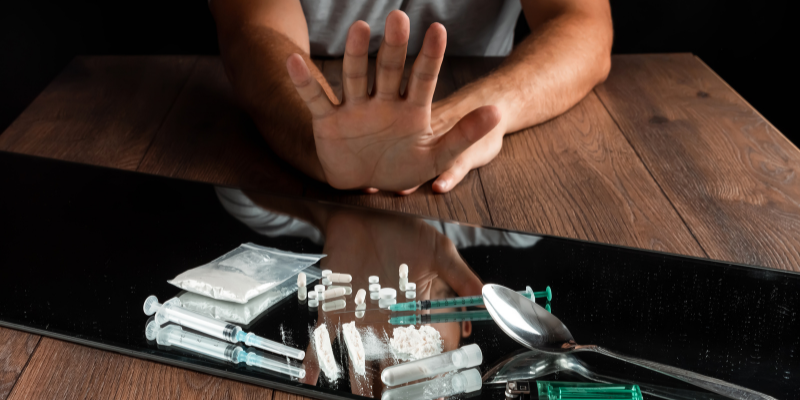
Many addiction treatment centers offer solid programs for overcoming addictions that ruin your life. So why do an estimated 40%-60% of people relapse? What’s missing?
The answer lies in your brain.
The brain is the supercomputer that runs your life. It plays a central role in your vulnerability to addiction and your ability to recover and maintain sobriety. Brain dysfunction is the #1 reason why people fall victim to addiction, why they can’t break the chains of addiction, and why they relapse. Understanding the brain’s role in addiction and recovery is the key to breaking free from your addictions.
How the Brain Keeps You Chained to Addiction
Your susceptibility to addiction depends in large part on the biological makeup of your brain and your brain’s reward system. What is the brain’s reward system? It is an intricate network of brain systems and neurotransmitters that are critical to human survival. It drives us to seek out the things we need to stay alive and carry on the human race, such as sex and food.
Many things that are not necessarily crucial to our survival also activate the reward system in a healthy way, such as:
- Listening to music
- Taking a warm bath
- Looking at a beautiful painting
Then there are substances and behaviors that cause the reward system to become overactive in an unhealthy way, such as:
- Opioids
- Cocaine
- Methamphetamines
- Alcohol
- Excessive gambling
- Compulsive shopping
Let’s take a closer look at the neurotransmitters and brain systems involved in the reward system so you can see how it works and how it gets out of whack. First, let’s examine the role played by four neurotransmitters. Neurotransmitters act as the brain’s messengers, relaying information within the brain. The strength or weakness of each of these neurotransmitters plays an important role in your ability to stop engaging in bad behaviors, such as compulsive gambling or shopping, or in driving you to addiction.
Brain Chemicals Involved with Cravings and Self-Control
Dopamine—motivation, saliency, drive, stimulant
Serotonin—happy, anti-worry, calming
GABA—inhibitory, calms, relaxes
Endorphins—pleasure and pain-killing properties
Dopamine is a feel-good chemical. Whenever we do something enjoyable, it’s like pressing a button in the brain to release a little bit of dopamine to make us feel pleasure. Cocaine, methamphetamines, alcohol, and nicotine all cause dopamine surges that make these substances highly desirable—sometimes even more desirable than the things we need to survive like food, water, and sex. The amount of dopamine released when drugs are taken can be 2-10 times more than what your brain produces for natural rewards. When dopamine is in low supply, it is linked to depression, ADD/ADHD, addiction, and other mental health issues.
Serotonin is thought of as the happy, anti-worry, flexibility chemical. Many of the current antidepressants work on this neurotransmitter. When serotonin levels are low, people tend to be worried, rigid, inflexible, oppositional and argumentative, and they are more likely to suffer from anxiety, depression, obsessive thinking, or compulsive behaviors.
GABA, or gamma-aminobutyric acid, is an inhibitory neurotransmitter that calms or helps to relax the brain. If you have suffered an emotional trauma or you are under a lot of stress, GABA may be depleted and your emotional or limbic brain may become excessively active, which is associated with depression and stress. This can lead you to use substances in an attempt to self-medicate and calm your limbic brain.
Endorphins are the brain’s own natural pleasure and pain-killing chemicals. They are the body’s own natural morphine or heroin-like compounds. Substances like opioids trigger the release of endorphins, which are heavily involved in addiction and the loss of control.
Why Can’t I Just Say No? The Brain’s Self-Control Circuit
The brain systems that drive you to seek out things that bring you pleasure and the prefrontal cortex (PFC), which puts on the brakes when you are about to engage in risky behavior, work in concert to create your self-control circuit.
In a healthy self-control circuit, an effective PFC provides impulse control and good judgment while the deep limbic system offers an adequate dose of motivation so you can plan and follow through on your goals. You can say no to alcohol, illegal drugs, prescription opioids, gambling, and many other bad behaviors.
In the addicted brain, the PFC is diminished and the drive circuits take control. When the PFC is underactive, it can create an imbalance in the reward system and cause you to lose control over your behavior. When this is the case you are more likely to fall victim to relapse despite your desire to stay in recovery. Having low activity often results in a tendency for impulse-control problems and poor internal supervision, and is associated with ADD/ADHD.
To overcome addiction, stick with a recovery program, and avoid relapse, it’s critical to address any underlying brain dysfunction as well as any co-occurring mental health conditions.
At Amen Clinics, we use brain SPECT imaging as part of a comprehensive evaluation to help our patients see and understand any underlying brain dysfunction. This is often a powerful first step to breaking the chains of addiction. We use an integrated brain-body approach to healing the brain and treating co-occurring mental health problems. If you want to join the thousands of people who have already enhanced their brain health and overcome their addictions and psychiatric symptoms at Amen Clinics, speak to a specialist today at 888-288-9834. If all our specialists are busy helping others, you can also schedule a time to talk.





You did not include tobacco in your addiction list
Comment by Gord Harrison — February 24, 2020 @ 6:49 AM
I was hoping for so much more from this article. 🙁 What are some examples of ways to help the PFC be more active? Are there some story example that can be linked to this article?
Comment by Hannah — February 24, 2020 @ 7:16 AM
Does medicare pay anything on tbe brain imagining tests? I am a U.S. retiree living in Mexico on social security..
Comment by Toni Miller — February 24, 2020 @ 11:03 AM
According to many online webinars I have listened to, with f-u-n-c-t-i-o-n-a-l medicine doctors, our microbiome communicates with the brain via molecular pathways, and Candida (yeast) feeds on sugar/alcohol and signals to the brain demand for sugar/alcohol and that is where the sugar/alcohol craving comes from. To curb the craving it helps to put 1/2 tsp L-glutamine powder (sold on amazon) under the tongue and let it melt. Candida is in our body naturally but it grows out of proportions with use of antibiotics, chemo therapy for cancer, also use of pesticides in agriculture (that’s why everybody should eat only organic).
Dr Daniel Amen, the founder of Amen Clinics, has been interviewed by functional medicine doctor Mark Hyman, the founder of Cleveland Clinic, a functional medicine healthcare system, many times, discussing the connection between our microbiome and the brain. I don’t understand why this vital information is not part of this article about alcohol addiction.
Comment by Yvonne Forsman — February 24, 2020 @ 3:39 PM
Re sugar cravings b/c of Candida, I was on chemotherapy for breast cancer years ago, which destroyed my microbiome, the balance between good and bad bacteria, killing the good ones which made Candida grow out of proportion, becoming systemic, causing oral trush (white coating of tongue) and toe nail fungus. I have been trying to deal with the Candida overgrowth for many years, following the Candida diet which includes cutting out certain foods and also adding certain herbs. I always failed after a while when the sugar cravings became overwhelming (my brain was constantly thinking about ice cream and yogurt). It is said that sugar is more addicting than heroin! But now I use the L-glutamine powder to curb the sugar cravings and I have finally been able to stay on the Candida diet for several months now. I have cut out sugar, alcohol, soft drinks, dairy, fruits (except berries), grains, candy, desserts, and night shades (potatoes etc). I use stevia and allulose sweeteners (amazon) and grain free/gluten free flours for baking, such as almond, coconut, cassava, sorghum, tigernut flours and corn starch in desserts (Paleo diet recipes). Everything I eat is of course organic to avoid the pesticides in foods (which cannot be washed off, they are inside the food). Except of Candida feeding on sugar, cancer does also. I am also staying away from sugar b/c my dad died in diabetes at the age of 54 and I want to avoid the same destiny. Also, Alzheimer’s is called diabetes 3! Many ppl die from Alzheimer’s. Btw, oral trush is contagious so b/f you kiss anybody check their tongue color! (I am divorced and not dating.) Many ppl have Candida grown out of proportion w/o being aware of it. Some doctors prescribe FLuconazole antibiotc which in some cases makes the Candida overgrowth even worse once the antibiotic has ended, but in some cases it does help. Candida has one function in the body: to decompose it after death. It cannot be completely eradicated, but its place is in the intestines, not spread throughout the body.
Comment by Yvonne Forsman — February 24, 2020 @ 4:22 PM
I am in desperate need of help. I am and have been a compulsive over eater for most of my life. My weight is always going up and down by 80 pounds. I eat everyday. Till I’m ready to burst. Mostly junk food. My main addition. Then when I diet. I eat so little. I lose weight so fast. The here I go again, I start eating. I’m a 59 year old woman who loves life and wants to live. I want to be healthy. I want to be able to just eat normally. I’m reaching out in the hope I can get help. But I can only except the help if my insurance covers the plan.
Comment by Mary — February 24, 2020 @ 6:56 PM
Exactly Yvonne! I’m just realizing all of what you said for my own body. Thank you for sharing.
Comment by Candace M — February 25, 2020 @ 5:06 PM
Hello Mary, we’d be happy to contact you directly to further discuss insurance, reimbursement, financing options and any other resources we can offer you. We look forward to speaking with you.
Comment by Amen Clinics — February 26, 2020 @ 12:36 PM
Hello Toni, thank you for reaching out. Reimbursement by insurance companies varies according to your plan. Amen Clinics, Inc. is an out-of-network provider. We’d be happy to reach out to you directly to discuss insurance, reimbursement, financing options and any other resources we can offer you.
Comment by Amen Clinics — February 26, 2020 @ 12:38 PM
Excellent overview of the #1 overlooked reason for addiction … made straightforward and simple. So grateful there is hope and for the knowledge that many brain health issues ARE TREATABLE… but if people continue to not get a more accurate diagnosis… they are doing a disservice to themselves and all the lives around them. I have heard concerns about the price of brain SPECT imaging, but what many fail to consider is the cost of a rehab, a divorce, a ruined life of self and others… or worse yet… the loss of life to overdose… even a basic MRI is much more costly than the price of SPECT, and a CAT scan and MRI does not necessarily SHOW the function of the brain like SPECT does. Put into proper perspective, the cost of SPECT is minimal when compared to the lifelong consequences for misdiagnosis or lack of proper treatment or even death. I personally have spent over $50,000 on rehabs, legal fees, and wrecked vehicles alone with my son’s substance use disorder, not to mention the pain and suffering that affected the whole family… I’d give my right arm to have known about The. Amen Clinic Method for my son 10 years ago… thankfully, he is finally well today after 7 years of pain. Thank you Dr. Amen for pioneering the road of HOPE for treatment and making recovery REAL!
Comment by Nadine Blase Psareas — March 1, 2020 @ 11:58 PM
What is the cost of a spect image?
Comment by Samanthaj — March 2, 2020 @ 6:07 PM
Hi, does Tricare cover any of the spect scans?
Comment by Samj — March 2, 2020 @ 6:39 PM
I am concerned about your information about GABA… It is counter indicated with alcoholics because they have a higher level of GABA which trigers relapse…. To lower GABA in alcoholics, it has been documented that baclifin will help. Dr. Amen, please contact me if you want the paper mailed to you. Thanks for you time, Dr. Ken
Comment by Dr. Ken — March 7, 2020 @ 7:37 AM
I adore reading and I believe this website got some really useful stuff on it! .
Comment by zoritoler imol — November 14, 2023 @ 7:31 PM
Pretty portion of content. I simply stumbled upon your site and in accession capital to say that I get actually loved account your blog posts. Any way I’ll be subscribing in your augment and even I fulfillment you get right of entry to constantly fast.
Comment by graliontorile — December 2, 2023 @ 9:35 PM